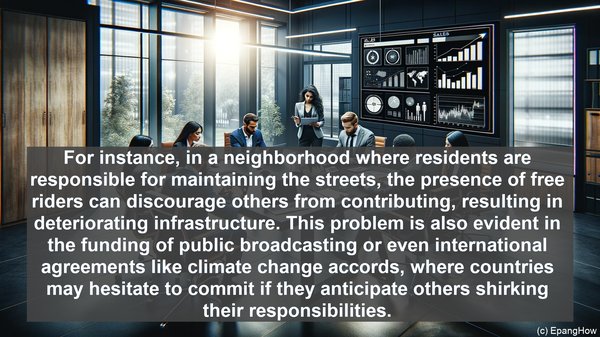Introduction: The Dilemmas of Collective Action
Hello everyone! Have you ever wondered why some public goods are underprovided or why common resources are often overexploited? These are questions that have puzzled economists and policymakers for decades. Today, we delve into two key concepts that shed light on these dilemmas: the Free Rider Problem and the Tragedy of the Commons.
The Free Rider Problem: Benefiting Without Contributing
Imagine a scenario where a group of individuals is asked to contribute to a public good, such as maintaining a park. While some willingly contribute their time and resources, others choose to ‘free ride’ – enjoying the benefits without making any contribution. The Free Rider Problem arises when the collective provision of a good is undermined by the rational self-interest of individuals. After all, why would someone contribute if they can enjoy the benefits regardless of their contribution?
Implications and Examples of the Free Rider Problem
The Free Rider Problem has far-reaching implications. In the realm of public goods, it can lead to underinvestment and the potential collapse of essential services. For instance, in a neighborhood where residents are responsible for maintaining the streets, the presence of free riders can discourage others from contributing, resulting in deteriorating infrastructure. This problem is also evident in the funding of public broadcasting or even international agreements like climate change accords, where countries may hesitate to commit if they anticipate others shirking their responsibilities.

The Tragedy of the Commons: The Perils of Unregulated Access
While the Free Rider Problem focuses on the lack of contribution, the Tragedy of the Commons centers around the overuse or exploitation of a shared resource. Picture a common grazing area where multiple herders bring their cattle. Each herder has an incentive to maximize their own herd’s grazing, leading to overexploitation and the eventual degradation of the pasture. The tragedy lies in the fact that while each herder’s actions may be individually rational, the collective outcome is detrimental.

Historical and Modern Examples of the Tragedy of the Commons
The Tragedy of the Commons is not a new phenomenon. In medieval times, unregulated fishing in common water bodies often led to depleted fish stocks. Today, we see similar challenges in the context of natural resources like forests or even the global issue of climate change. The absence of clear property rights or effective regulations can exacerbate the Tragedy, as individuals prioritize their immediate gains over the long-term sustainability of the resource.
Addressing the Challenges: Solutions and Strategies
While the Free Rider Problem and the Tragedy of the Commons present significant challenges, they are not insurmountable. Various strategies have been proposed and implemented to mitigate these issues. In the case of the Free Rider Problem, mechanisms like conditional contributions or the provision of selective benefits can incentivize participation. When it comes to the Tragedy of the Commons, solutions range from the establishment of clear property rights to the implementation of quotas or even the creation of community-based management systems.
